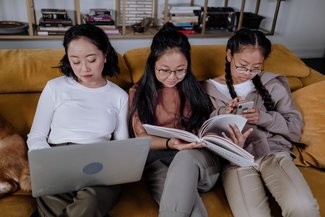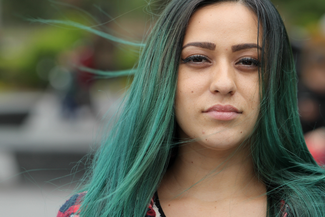
Girls Speak
Agenda Alliance's campaign to ensure girls and young women facing inequality, poverty and violence get the support and protection they need.

18 Mar 2022
By Indy Cross, Chief Executive of Agenda
By now, we’ve all read or seen the news this week about Child Q – the Black girl subjected to an inappropriate police strip search, which left her traumatised, with profound repercussions on her mental health. It’s a harrowing read, and I can’t bring myself to think about what it would have been like for her…
The investigation found that racism was likely to have been an “influencing factor” in the officers’ actions and that if the girl had not been Black, then her experiences are unlikely to have been the same. This is shameful. It’s shocking to hear the ordeal she experienced at the hands of police officers and teachers at such a young age. It clearly demonstrates the significant impact of racism experienced by Black girls and young women in spaces where they should feel safe and the failure of those with safeguarding responsibilities to protect them from harm.
We know that being discriminated against on account of both their gender and ethnicity, Black girls and young women are more likely to face barriers in accessing safety and support as overlapping forms of stigma and discrimination put them at greater risk of criminalisation and ongoing mental health issues. Time and time again, Black and minoritised girls and young women have told us about how professionals’ reliance on racist stereotypes and adultification of Black girls have resulted in them feeling alienated, stigmatised and traumatised by their interactions with them.
To tackle the racial discrimination experienced by Black and minoritised girls and young women, we must see significant change in the way professionals – from education to criminal justice – respond and act, with a focus on anti-oppressive, age-appropriate and trauma-informed ways of working. Listening to those with both lived and learned expertise, and acting on the evidence they provide, must be at the heart of work to create a more equal and anti-racist society.
Our report into the experiences of young women in the criminal justice system lays bare the racism and misogyny that Black and minoritised girls face. Furthermore, we know that 74% of girls in youth custody have previously been permanently excluded from school. That is a clear pathway and we cannot ignore this as a society. We must listen to girls’ experiences of racism and sexism in schools, and we at Agenda are working with members of our alliance to do just that.
Ebinehita Iyere, founder of Milk Honey Bees is one of the organisations that are supporting our Girls Speak project and is a member of our Alliance. She has told me:
“This should and could have been prevented, in fact it should never have happened. The unfortunate experiences of Child Q need to be a wake-up call to all institutions who are meant to safeguard and protect children and review all policies and practices that have any biases, especially racism and adultification. The ripple effect this will have on Black girls is why we need to prioritise their needs and the only way this can be done is by listening to Black girls and working with the professionals who work with and for their liberation and protection.”
Agenda will not let this issue go. We’re fed up with girls and young women being ignored – particularly Black and minoritised girls. Let’s not forget that we are talking about a child. This must never happen again. We must all act now.

Agenda Alliance's campaign to ensure girls and young women facing inequality, poverty and violence get the support and protection they need.

Engaging with young women, front-line staff and other experts to build an evidence base about the needs of girls and young women in contact with the criminal justice system.